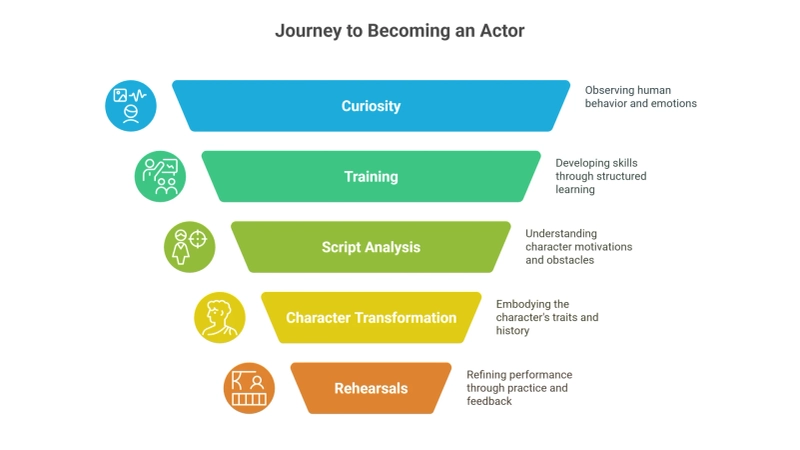What Is the Acting Process?
The acting process is often misunderstood. It’s not just memorizing lines or pretending to be someone else. It’s a journey that involves deep self-discovery and emotional exploration. You dive into a character’s world, understand their motivations, and bring them to life honestly. This process takes patience and practice, but it’s incredibly rewarding when everything clicks.
Why Curiosity Is the Heartbeat of Acting
Curiosity drives every great actor. Without wanting to explore human behavior, emotions, and stories, acting feels empty. You start noticing people, their gestures, and emotions in everyday life. This observation helps build authentic characters. Curiosity pushes you to ask “why” and “how,” which is essential in the acting process.
The Importance of Training
Training is not a luxury; it’s a necessity. Even the most talented actors must sharpen their skills through workshops, classes, and practice. Training teaches you to be present and to listen—two crucial elements in acting. It also helps you unlearn bad habits and build new techniques. Institutions like APAC, a musical theatre course in Brisbane provides structured training to prepare actors for real-world challenges.
Understanding Different Acting Techniques
There are many acting methods, and each offers unique tools. Stanislavski focuses on emotional truth, while Meisner emphasizes reacting in the moment. Strasberg teaches emotional memory, and Chekhov uses imagination and movement. Learning different techniques lets you find what fits your style. This variety enriches the acting process and keeps it fresh.
Breaking Down the Script
A script is more than words on paper. It’s a map of the character’s journey. When you break down a script, you look for what the character wants and what obstacles they face. This analysis helps you deliver a genuine performance. The more you work on the script, the less it feels like memorization and more like living.
Becoming the Character
Becoming a character is both exciting and challenging. You change your voice, posture, and gestures to fit the role. But the real work is internal: understanding their fears, desires, and history. This transformation creates a believable and relatable character. It’s one of the most rewarding parts of the acting process.
The Role of Rehearsals
Rehearsals are where the acting process truly takes shape. You try different choices and get feedback from directors and fellow actors. Sometimes it feels frustrating, but that’s normal. Through repetition and experimentation, scenes become alive. Rehearsals build confidence and deepen your connection to the character.
Using Your Body and Voice
Acting is a full-body experience. Your body language and voice carry as much meaning as your words. Training your body to express emotions clearly helps tell the story better. Vocal control ensures your message reaches the audience. Together, body and voice create a powerful presence.
Why Improv Matters
Improvisation teaches you to stay present and trust your instincts. Without a script, you learn to react naturally. Improv sessions build spontaneity and creativity. It’s a fun way to break out of your comfort zone. Many actors find improv essential to their growth.
Acting for Stage vs. Screen
Stage acting requires bigger gestures and a louder voice to reach the audience. Screen acting demands subtlety since the camera picks up every detail. Both forms have different challenges and techniques. Knowing how to adapt is a crucial skill. APAC trains actors for both mediums, making them versatile performers.
Dealing with Rejection
Rejection is part of the acting world. It’s tough but not personal. Every actor faces it at some point. Learning to bounce back builds resilience. Focusing on growth rather than approval keeps you motivated.
The Thrill of Performance
Performing live or on camera is exhilarating. All the hard work comes together in one moment. You lose yourself in the character and the story. The energy from the audience or crew fuels you. That feeling makes the struggle worthwhile.
Why the Acting Process Matters
The acting process is more than a skill; it’s a way to understand people and ourselves. It teaches empathy and emotional honesty. Actors tell stories that inspire, challenge, and heal. That’s why the process is so meaningful.
Training at APAC
APAC offers training that balances theory and practice. They guide you through all stages of the acting process. From script analysis to performance, they help you grow as an artist. Their supportive environment makes learning enjoyable. It’s a place where passion meets professionalism.
Conclusion
The acting process is a blend of curiosity, discipline, and heart. It’s about discovering truth in stories and yourself. With the right training and mindset, anyone can grow in this craft. Whether you dream of stage or screen, the journey is worth every step. Dive in, keep learning, and let your story unfold.

